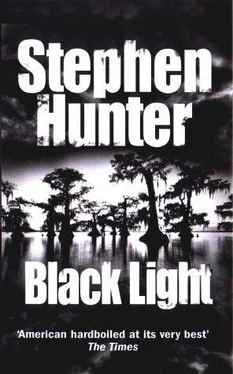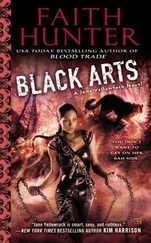Stephen Hunter - Black Light
Здесь есть возможность читать онлайн «Stephen Hunter - Black Light» весь текст электронной книги совершенно бесплатно (целиком полную версию без сокращений). В некоторых случаях можно слушать аудио, скачать через торрент в формате fb2 и присутствует краткое содержание. Год выпуска: 1996, ISBN: 1996, Издательство: Island Books, Жанр: Триллер, на английском языке. Описание произведения, (предисловие) а так же отзывы посетителей доступны на портале библиотеки ЛибКат.
- Название:Black Light
- Автор:
- Издательство:Island Books
- Жанр:
- Год:1996
- ISBN:0-385-48042-3
- Рейтинг книги:3 / 5. Голосов: 1
-
Избранное:Добавить в избранное
- Отзывы:
-
Ваша оценка:
- 60
- 1
- 2
- 3
- 4
- 5
Black Light: краткое содержание, описание и аннотация
Предлагаем к чтению аннотацию, описание, краткое содержание или предисловие (зависит от того, что написал сам автор книги «Black Light»). Если вы не нашли необходимую информацию о книге — напишите в комментариях, мы постараемся отыскать её.
Black Light — читать онлайн бесплатно полную книгу (весь текст) целиком
Ниже представлен текст книги, разбитый по страницам. Система сохранения места последней прочитанной страницы, позволяет с удобством читать онлайн бесплатно книгу «Black Light», без необходимости каждый раз заново искать на чём Вы остановились. Поставьте закладку, и сможете в любой момент перейти на страницу, на которой закончили чтение.
Интервал:
Закладка:
“Yes sir,” said Bob chastely, nothing showing on his bland face. “I sure wish I’d had a chance to work the jungle with that kind of equipment.”
His piece said, the general returned to the technical and the arcane.
“The M-3 was a great advance over the M-2 system of World War II, yet in Korea the troops hated it and the army itself didn’t really understand or follow up. It was my idea to run the thing through a night-battle wringer and try to develop doctrine. Fortunately, somebody read my idea in Infantry Journal and I was given a chance to practice what I’d preached. We called the project B LACKL IGHTand ran it out of Camp Chaffee, where we tried to devise some data for night operations with vision devices. We were stuck with the goddamned M-3s. But at least we were able to show the R&D boys what was necessary in a night-combat environment. No one really knew until that time. They’d just copied the German hardware.”
“Tell us about B LACKL IGHT.”
The general launched into a long and somewhat self-serving account of the project, and it soon developed that the problem with him wouldn’t be getting him to talk but getting him to shut up. His chatter soon evolved into performance, soliloquy, ultimately a one-man show, punctuated by theatrical blasts of smoke. He looked like the god of war, Mars himself, sitting there under his reasonable gray hair as the clouds swirled and he gave pronouncement. Much of his presentation seemed to turn on obscure issues, like trying to find the right number of men that stayed within command parameters and yet were adequate to provide security for the shooter. Months were spent determining if six or eight or ten were better, and the ultimate choice was four, given that the sniper himself could do double duty in a firefight with a greasegun. Night command vocabulary was tested; night map reading was examined and night navigation; radio techniques were explored. The shooting was a relatively late part in it.
“About ’55 we got to the shooting.”
“What did you use for targets? The Germans used people, you said.”
“On the record? On the record, heat-generating targets were not mandatory, because we were only beginning to understand the principle of ambient light, that is, passive night vision. We used the M-3’s active infrared, that is, an infrared searchlight. We could have shot at anything. But there was a ballistic component to the project which mandated load testing on living organisms. Off the record, we shot sheep and goats. Cattle would have been preferable because their respiratory system most resembles humans, but I had no stomach for trying to bring down a steer with a bullet that at its best generated muzzle energies somewhere between a .38 Special and a light .357 Magnum.”
On and on it went, through the construction of the units, problems with the clamps that secured them, difficulty with the webbing that supported, and so forth and so on. Russ thought he’d doze.
“I’m just curious,” said Bob finally, and Russ knew that he’d played out the whole long hand, nursed the man’s vanities and ego, gotten through the bullshit lecture on “individual heroism vs. team spirit and body count” to get to this point at last, “what sort of administrative control could there have been on the units themselves? Was it standard infantry arms-room administration; was it more stringent? Who actually controlled the units? The actual M-3s?”
“Technically, I did, though the true administration of the project fell in the hands of my first sergeant, whose name was Ben Farrell. Very good NCO. Killed outside Da Nang in ’64.”
“Who controlled the arms-room keys?”
“Well … what does this have to do with anything?”
There was an awkward moment.
Then Russ said, “The truth is, we think there’s a movie potential for this book. And the reason I wanted to talk about night vision was that I had an idea for a funny scene. Young soldiers break into the armory and steal some night-vision devices. They use them to spy on a WAC encampment, some girls with nice tits. Tits and ass. That’s the kind of wacky stuff the movies love.”
“Oh, Lord,” said the general. “Why don’t you just make it up? What do you need my help for?”
“Sergeant Swagger insisted that everything be at least based in reality.”
“Well, I can assure you nobody used our hardware to spy on WACs and if you knew anything about the WACs of the fifties, you wouldn’t want to spy on them either.”
“We could make it nurses,” said Russ. “Would that be better?”
The general made a face of disgust. “Hollywood,” he said. “No, it’s impossible. There were only two arms-room keys. Three, I assume the base commander had one but he paid us no mind. We had our shop, our barracks space and use of three range facilities and various field assault courses. The only two keys were controlled by First Sergeant Farrell and myself and he was a Prussian in the discipline department. No one used those weapons without our permission or knowledge. Which means no one used them, period.”
Bob veered away from the point.
“Did you find the units equally effective?”
“No,” said the general, relaxing somewhat, and expelling a long whoosh of dark smoke, and went on to explain the difference in the units, the difference in the lots of ammunition, the difference in the three carbines themselves.
It went on like that, Russ pretending to keep notes, Bob prodding with gentle questions, up to and including the general’s astonishingly successful stewardship of the Tiger-cat Sniper School, the record number of kills racked up once the mounting problems for the Starlight on the M-21 were solved, and so on.
Late in the afternoon, Bob circled in for another pass.
“Could we just get back to B LACKL IGHTone more time, sir?” he asked.
“Certainly, Sergeant,” said the general.
“We agreed, the young man and I, that this book would be better if there were some personalities in it. So I’m thinking: there at Chaffee in ’54 ’55: any outstanding personalities involved? How big a team was it? Who were they?”
“The usual. Good men. Toward the end, representatives from Varo Inc. and Polan Industries, who ultimately got the initial Starlight scope contracts. Some civilians TDY from Army Warfare Vision at Fort Devens. You know, I have a picture. Is that interesting to you?”
“Yes, sir. Like to see it.”
“It’s over here, on the wall.”
He led them to the wall and pointed the picture out. Like the others it was a mixed group of civilians and soldiers standing and kneeling; Preece himself, much thinner but somehow rawer, crouched in the front row, holding the carbine with the huge optical device mounted. He wore army-green fatigues with his name on a white name tag and one of those goofy turret caps that were issue in the fifties. The men around him were doughy, unimpressive, unmemorable: they looked like NASA flight controllers, faintly ridiculous in the casual clothes of the era, mostly short-sleeved white shirts with slacks and lumpy oxfords.
“I should have had them write their names down,” the general said with a laugh. “I only recognize a few. That’s Ben Farrell. That’s Bob Eadings, of Polan.”
“Who’s that one?” asked Bob, pointing to a kneeling figure at the edge of the photograph, a young man with a certain pugnacious set to his square, blocky head, who looked strong beneath his clothes and had a set of fiercely burning eyes.
“That guy,” said Preece. “Lord, I remember him. He was from Motorola, I think. He was only on the project for two weeks but it happened to be the two weeks we took the picture. I cannot for the life of me remember the name.”
Читать дальшеИнтервал:
Закладка:
Похожие книги на «Black Light»
Представляем Вашему вниманию похожие книги на «Black Light» списком для выбора. Мы отобрали схожую по названию и смыслу литературу в надежде предоставить читателям больше вариантов отыскать новые, интересные, ещё непрочитанные произведения.
Обсуждение, отзывы о книге «Black Light» и просто собственные мнения читателей. Оставьте ваши комментарии, напишите, что Вы думаете о произведении, его смысле или главных героях. Укажите что конкретно понравилось, а что нет, и почему Вы так считаете.












